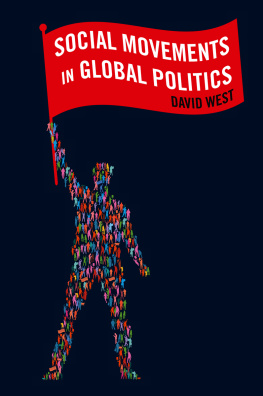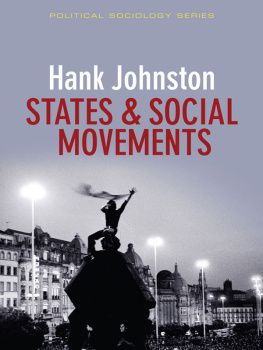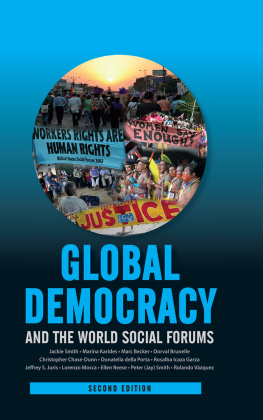Social Movements in Global Politics
Copyright David West 2013
The right of David West to be identified as Author of this Work has been asserted in accordance with the UK Copyright, Designs and Patents Act 1988.
First published in 2013 by Polity Press
Polity Press
65 Bridge Street
Cambridge CB2 1UR, UK
Polity Press
350 Main Street
Malden, MA 02148, USA
All rights reserved. Except for the quotation of short passages for the purpose of criticism and review, no part of this publication may be reproduced, stored in a retrieval system, or transmitted, in any form or by any means, electronic, mechanical, photocopying, recording or otherwise, without the prior permission of the publisher.
ISBN: 978-0-7456-7198-7
A catalogue record for this book is available from the British Library.
The publisher has used its best endeavours to ensure that the URLs for external websites referred to in this book are correct and active at the time of going to press. However, the publisher has no responsibility for the websites and can make no guarantee that a site will remain live or that the content is or will remain appropriate.
Every effort has been made to trace all copyright holders, but if any have been inadvertently overlooked the publisher will be pleased to include any necessary credits in any subsequent reprint or edition.
For further information on Polity, visit our website: www.politybooks.com
For Paul
We must resolutely reject all discourses that try to convince us that we are powerless. (Alain Touraine, Beyond Neoliberalism, p. 116)
Contents
Acknowledgements
I would like to thank undergraduate students in my courses on New Social Movements and Global Social Movements over the last two decades for their critical feedback, insightful questions and, on occasions, justified incomprehension. For their insightful comments on an earlier draft of this book, I am grateful to Barry Davies, David Eden, John Hart, Michael Leininger-Ogawa, Marian Sawer, Ryan Walter and Paul Davies. I would also like to thank two anonymous reviewers who, from their very different perspectives, offered a number of constructive suggestions. Melbourne Universitys School of Social and Political Sciences generously provided me with a room and facilities as a Visiting Fellow during 201112. The Australian National University allowed me sabbatical leave during the same period, without which writing this book would not have been possible.
A Political Preface: Social Movements, Global Crisis and the Failure of Institutional Politics
Outline
As its title suggests, this Political Preface sets the topic of social movements in the context of current events and emerging crises. It is prefatory in the sense that its content is not part of the more systematic exposition of subsequent chapters. The nature of politics and social movements is considered in chapter 1 and the rest of the story unfolds from there. The following sketchy remarks are designed instead to throw light on the importance of social movements and extra-institutional politics as a topic that is more than academic. Our understanding of politics both within and beyond existing political institutions influences both how we think and, more importantly, how we act politically. If the following remarks are themselves more political in a certain sense more controversial and more reflective of a substantive political position that fact is, to adapt Heinrich Blls phrase, neither intentional nor accidental but unavoidable.
1 The Crisis of Institutional Politics
In coming decades, the world faces intractable and, in some cases, potentially catastrophic problems. There are longstanding problems such as widespread poverty, untreated disease and insecurity in developing countries, endemic regional conflicts, wars and the growing dangers of nuclear proliferation. More recently, a series of environmental problems threatens to push the world towards crisis. World population has grown exponentially from around 2 billion at the beginning of the twentieth century and has recently exceeded 7 billion. It is expected to reach (and possibly stabilize at) somewhere between 9 and 10 billion people. At the same time, rising population is accompanied by continuing economic growth in affluent countries and rapidly rising living standards and consumption in a number of developing countries including the BRICS Brazil, Russia, India, China and South Africa. Although much of this economic development is obviously to be welcomed, to the extent that it increases the living standards of previously impoverished people, it still implies a rapidly increasing and ultimately unsustainable ecological burden on the planet.
The most prominent environmental threat is surely global warming, which threatens to transform the worlds climate in undesirable and possibly uncontrollable ways. A severe and intensifying impact on non-human species and biodiversity is already occurring. The availability of arable land and fresh water is threatened by population growth and climate change. On most predictions, rising sea levels will inundate low-lying areas of the world, including major cities inhabited by tens of millions of people. Some islands in the Pacific and Indian Oceans are already becoming uninhabitable.activities as well. Human impact on the world is the by-product of the growth of human population and the spread of agriculture and then industry. The anthropocene age is characterized by an unprecedented and exponential acceleration of the rate of environmental change. Climatic changes that previously took place over thousands or millions of years are now occurring over centuries and even decades. Ironically, despite the clear human imprint on the anthropocene age, it is unlikely to benefit the human beings who are now exerting such large effects, let alone non-human species and ecosystems.
We might expect that governments would be able to solve these problems, particularly the democratic and liberal governments now established in more developed countries. But in the face of the momentous threats just outlined, current responses from national and global political institutions are clearly inadequate. There is no sign that intractable problems such as poverty, untreated disease, inequality and war will be resolved. In response to global warming, liberal democracies appear unable to adopt policies that might be able to deal with the problem in a timely way, in part because these policies are unpopular with electorates who are focused on short-term and largely material goals. Governments have successfully regulated some forms of pollution and instituted measures such as environmental impact reviews. But they have so far proved unable to make sufficiently radical changes. Developing countries, which are more often governed by authoritarian regimes less directly constrained by popular opinion, place understandable emphasis on achieving rapid economic growth even at the cost of environmental damage. They are unwilling to make material sacrifices before they have even begun to enjoy the benefits of industrial society. However justified this position, with about 6 billion of the worlds 7 billion population, developing countries are therefore set to contribute very substantially to global warming. Finally, although there are international forums like the United Nations, which in theory transcend the limited perspective of individual nation-states, these institutions are only dubiously democratic, weak and unable to bring about international consensus. There is currently no single institution with the authority required to enforce just and effective solutions to environmental and other global problems in the common interests of all. As a result, nuclear proliferation continues apace. World poverty and hunger persist. In the case of global warming and despite achievements like the Kyoto Protocol, individual nation-states have so far failed to agree on common action of sufficient scale and urgency. Rich states, which have contributed by far the most to global warming until now, are still waiting for other states to act first, hoping to benefit as free-riders from the sacrifices of others and gain an advantage in the ongoing competition for wealth and power. All the signs are that both national and international efforts to address climate change will be far too little, too late.















